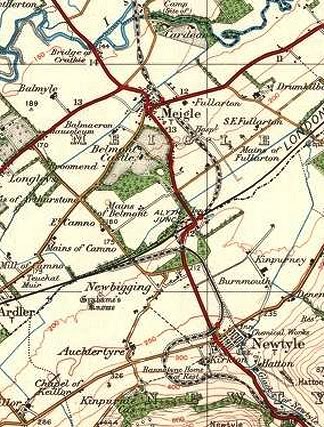

Newtyle to Alyth Junction and Alyth
NEWTYLE TO ALYTH JUNCTION & ALYTH
(Photos from Google Earth and Google Street Views)
(Update April 2015)


Newtyle to Alyth Junction and Alyth

The old line heading north from the Ex Bulb Park Road crossing heading towards Alyth Junction


One of the gate posts and a fence wire-tensioning post stands at the north side of Bulb Park Ex crossing site


Left: The remains of the turntable that stood between the old and new lines at North Junction. The track bed to Newtyle 'new' station in the background.
Right: The track bed looking northwards at North Junction


Left: Again looking northwards. Right Looking southwards


On the approach to the over bridges at the Netwtyle Road. The divergence to Ardler Junction and Perth rises higher above the track bed
to Alyth Junction Station track bed.

Looking southwards with the Ardler Junction branch on the right. The retaining wall makes it look as if there had been a platform at
this spot. This is also the site where the original line curved (to the left) northwards to join the Perth-Aberdeen direct line at Glammis.


Left: A bench built of sleepers stands on the raised Ardler branch track bed with a view over the western countryside.
Right: The Alyth Junction branch is on the right. Both looking north.


The embankment of the original D&N line can just be made out in the trees, running left to right. This line joined the Aberdeen-Perth line at Glammis Station to the north
of the Alyth Junction station site. It closed in the mid 1860's when the divergence lines was built.
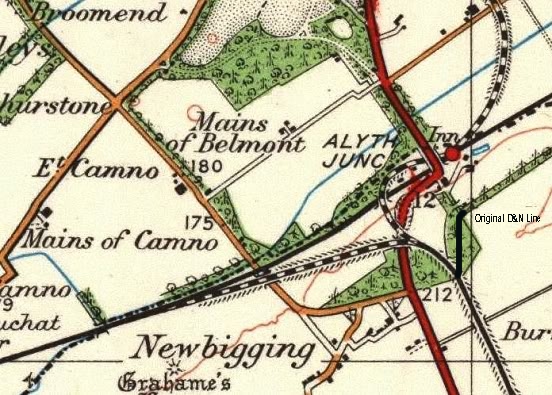
The Ardler curve & Alyth Jctn. Station Layout. The photos below start from the junction where the two
lines split and cross the B945 Newtyle Road over separate bridges then onto the Alyth Jctn. Station site.
N.B. The green strip seen south of Alyth Jctn. Station, on the map, is the remains of the original D&N
curve as it ran to join the A&P line at Glamiss It was abandoned when the new junction and station were built.


Left: Between the two branches at the Newtyle Road crossings. The 'higher' Ardler /Perth branch to the left. I am standing on the Alyth Jnct. track bed. You have to cross the road to continue
over the track bed to Ardler Junction.site. Right: The Ardler Junction line over bridge remains

Looking southwards on the Newtyle Road with the Alyth Junction over bridge
nearest and the (higher) Ardler Junction to Perth over bridge ahead.


Left: The Ardler Jct. over bridge looking south. Right: Looking north. Standing between the two bridges.


Left: The Ardler Jctn. over bridge looking north with the Alyth Jct. over bridge just ahead. Right: Looking south with the Ardler Jctn. over bridge just ahead.


Left: April 1981. I caught 25108 coming from Ardler Junction on the Perth line, with the long D&N curve on the left towards Perth, with a trip to Cupar (Angus) where
the line terminated at this time. The line from the D&N to Alyth Jct. Stn. ran across in front of the camera and would have blocked the view as it crossed the A&P on an
embankment with an over bridge. Right: The train is approaching where D&N over bridge was, with the branch curving towards Alyth Jct. Station and followed
by the the bridge shown above.

 /0129
/0129
April 2011. Approximately from the same spot as above left. Still recognisable but well overgrown. You can just make out the mound on the right where
the D&N went over the Aberdeen-Perth line and then curve down to the D&N side of Alyth Jct. station. I couldn't cross this field to check the remains
out as crops were growing.
UPDATE APRIL 2015
While walking the Adler Spur I found that the field where the Alyth Spur embankment crossed was lying fallow and was able to walk across the field to the spot
where the D&N crossed the A&P and turned northwards, dropping down to the the D&N side of Alyth Junction station, where trains joined the Alyth Town branch.


Left: The stump of the Alyth Spur embankment. Right: From the same spot in the field looking south with the D&N Ardler spur to the left and the A&P to the far right.


Closer views of the Alyth Spur remains. N.B. the two A&P telegraph poles still standing.

Left: The stump of the end of the Alyth Spur embankment where it crossed the A&P line.


Left: Following the telegraph poles towards Alyth Junction station, with the Belmont Arms Inn on the B945, to the right. The entrance to the station as to the
right of the Inn. Right: Remains of the D&N bridge embuttments that crossed the A&P line.




The A&P Down signal still stands. N.B. the track circuit diamaond sign. There was also an extra lever joint to assist the long pull from Alyth signalbox.
It's a shame that the Final has gone from the top of the post. It had been a high climb for the lampman.
=====


Left: I would have been centrally been under the Alyth Spur embankment, looking south to where it joined the B945 over bridge.
Right: Another view looking south between the two lines of railway track bed.


The A&P telegraph pole by the Ex D&N over bridge.
==========================================================================================

The Belmont Arms Inn. The main track to the station was off to the right and went around the back of the Inn.
The wooden stairs down to the Up platform were by the picket fence on the left.


Belmont Arms Inn Signs


The photos below are of the two bridges that run under the main road by the Belmont Arms Inn. The Perth-Aberdeen line runs west to east, while the D&N branches
off to the south with one line heading west to join the Perth line and the northerly D&N line curves over the Perth line then eastwards to join up at Alyth Junction Station
Left: The Newtyle Road over bridge by the Belmont Arms. Right: Looking north. The D&N over bridge is a little further up ahead.


)/IMG_0163.JPGLeft: The station side of the D&N over bridge. Right: The Dundee side of the D&N over bridge.

From the A&P over bridge. Looking north over the station site. The station house and buildings would have
been blocking the view on the right. The track bed has been back-filled up to the parameter of the land
now privately owned.

From the A&P over bridge looking south with the remains of the goods yard on the right.

It's difficult to realize just how clear everything was when the railway was in operation, comparing it to the wildly
overgrown scene below, but which is similar all over our working railway system today. It is interesting too that
the D&N bridge seen to the right has already been filled in. (J. R. Hulme).

View from between the two over bridges looking west. The A&P goods yard on the left and Ex railway
Houses. The D&N came in to the right of the houses.


Left: The Ex A&P Alyth Jct. Stationmaster's House. Right: Remains of the Goods Bay platform.

Remains Of Goods Bay Platform.


Left: Remains Of A&P Goods Yard Crane. Right: Unused Ganger's Hut concrete sections.


The D&N track bed from Newtyle, dropping down and behind Alyth Jctn. Station and into the separate branch platform for the Alyth branch.


On the Aberdeen-Perth track bed by the Newtyle Road over bridge. The Ex Alyth Junction Station Down platform is still in situe. There were wooden steps down
from either side of the bridge down to the platforms. Left: Looking towards Aberdeen. Right: Looking Towards Perth.

From the south end of the Up platform. The two-storie station house stood to the left and would have hidden the railings and the
steps that came down rom the B945 to the station level. The D&N came in from the nextover bridge that was just out of sight to
the far right.

A closer view of the north side of the over bridge with the end of the Down platform to the right. The main line running south
towards Ardler Junction and Perth with he A&P Goods sidings on the right, behind the bridge.

Alyth Junction Station. Looking northwards from the fence separating the new owner's land from the rest of the main
track bed. The fence straddles virtually the same position as where the station footbridge stood.


Left: Base of the Up Platform waiting room. Left: Possible base of the high water tank that stood to the north side of the waiting room.


Lewft: Some stone slab remains on the platform edge of what was the bay platform, with the back of the D&N single platform station in the background.
Right: The mill, behind the Down ain platform.


My thanks to the land owner for allowing me to enter the old station site. A lot of work has gone into the building of picturesque rockeries along the
length of the station track bed. Left: Looking northwards. Right: Looking southwards.

From the base of the down platform waiting room, looking north with the old mill on the right.

A colourful display as the infill starts to increase to platform level.

Heading For Perth, Glasgow, or Dundee via the D&N!


The Water Wheel at the old Mill.

End of the track bed within the private grounds. The track bed can be followed northwards beyond this point but as this the
A&P line, that's for another web site!
Here are two web sites showing excellent old photos of Alyth Junction Station, which will give you a good comparison with some of
the photos above. The first is from the RailScot web site and the second is from the Royal Commission Of Historical Sites (Canmore) web site.
http://www.railbrit.co.uk/location.php?loc=Alyth%20Junction
http://canmore.rcahms.gov.uk/en/site/78987/details/alyth+junction+station/
ALYTH JUNCTION TO ALYTH
I have no photos of this section at the moment and have used screen grabs from Google Street Views to give and indication of what remains today.
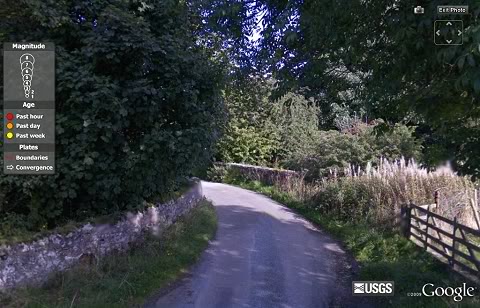

Two views of the over bridge to the north of Newtyle
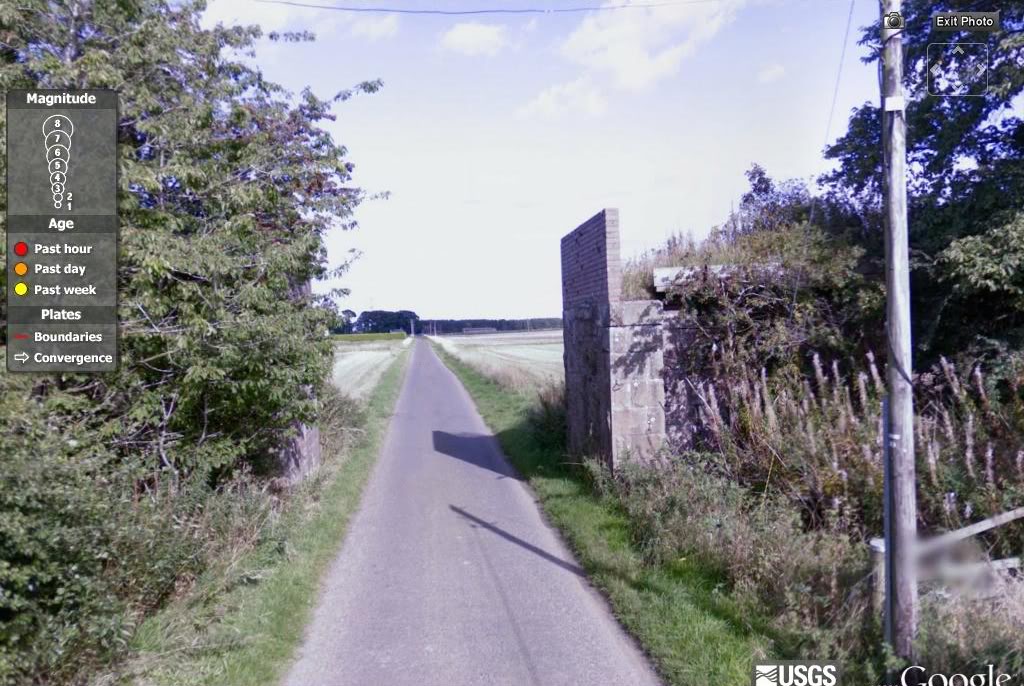

Left: Remains of the over bridge between Alyth Junction and Meigle Station: Right: Track bed looking towards Meigle, seen in the distance..
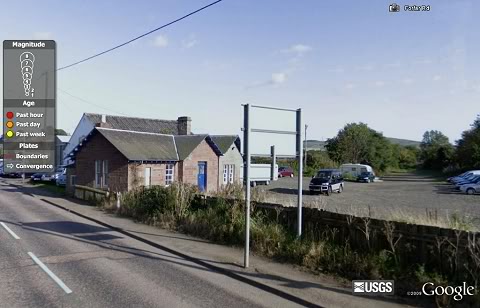

Left: Meigle Station site, which is on the Newtyle side of the Perth Road. Right: View from the opposite side of the station, looking towards Alyth
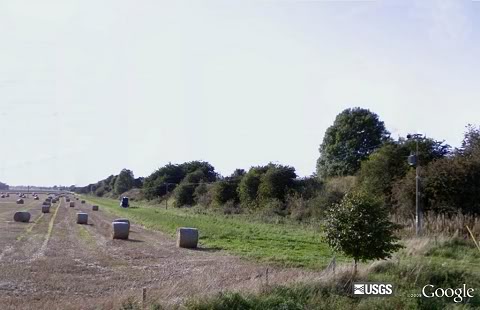
Track bed north of Meigle looking towards Jordanstone and Alyth
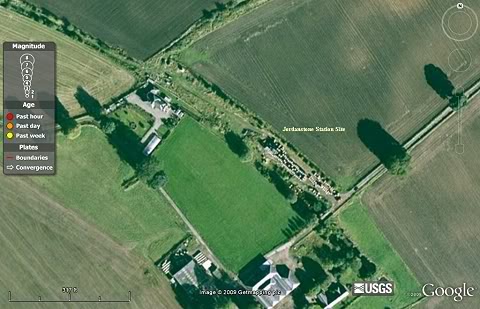

Left: Site of Jordanstone Station between Meigle and Alyth Station. Right: Golf Course Halt, to the east of Alyth
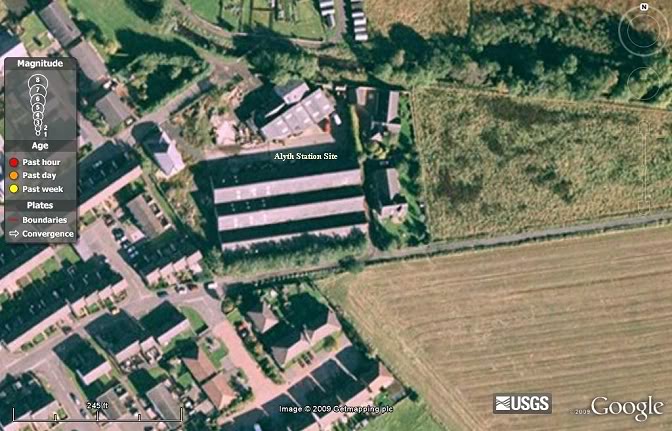
Alyth Station Site
New January 2010
“With thanks to John Henderson for sending me details and photos of his late grandfather who was a clerk at Alyth Junction around 1899.
My namesake grandfather, John Henderson, was born at Couston, Newtyle in 1895, where my Great Grandmother Jessie Alexander (Nicoll) Henderson must have been a house servant and my Great Grandfather, Head
Gardener to Andrew Whitton’s household. From your map, I, for the first time, noticed that beyond Couston is/was a house called Henderson; not my Hendersons, as mine had come to live in Newbigging from
Achalader, Kinloch not long before my Grandfather John was born. John in due course traveled by train daily to Lochee Liff Road Public School, and became a ‘Callie’ employee as a clerk at Alyth Junction c. 1899,
a clerk at Dunblane Station c. 1901, then clerk at Stirling Station c. 1912, before becoming stationmaster at Longforgan c. 1914, stationmaster at Justinhaugh c. 1921, … ‘then promoted’ to Head Parcels Clerk at Stirling
in 1924, where he worked until he died in 1944, when I was 5 years old.My father James Nicoll Kerr Henderson (born 1908 in Dunblane) introduces his memoirs, thus ....
"With advancing years, and lowering horizons, it's a great comfort, and ever-increasing source of wonder, to look back and count ones blessings over these seventy odd years. I myself am no Cockney born within
hearing of London's Bow Bells, although the cathedral chimes still toll beautifully in the Scottish city Dunblane where I was born. Close by my birthplace, the river flowed over lovely waterfalls, in sight and sound of
which express trains thundered down the main line to the South, chugged their way up to the tunnel leading to the North, to say nothing of the local trains that lumbered past while others were shunted amidst much
clattering and rattling in the goods yard or sidings.
1908 is seventy four years ago and my father was a railway man in these days when the railway companies were four in number, all privately owned of course - The Caledonian Company, The North British Company,
The Highland Company and The GWRE. My father was employed by The Caledonian Company and in these days trade unions were in their infancy and wages were anything but generous. A railway clerk dealt with
all kinds of traffic - passenger, freight, goods and parcels. He worked a ten hour day, six days a week and had one week's holiday leave, without pay, each year. Practically everything in these days was conveyed by
rail because there were so few lorries, no buses and overall, traffic on the roads was very light. …… ”
As a railway enthusiast, you will no doubt appreciate the following .jpgs. ….. copied from my Grandfather John’s Deed Box … the opening of the Crieff - St Fillans Line in 1901!


Caladonian ticket 1901. (Copyright John Henderson)

Copyright John Henderson

Copyright John Henderson

Copyright John Henderson.
My Great Grandparents James Henderson and Jessie Alexander (Nicoll) Henderson lie in an unmarked grave [no stone] in Newtyle C of S Kirkyaird as in the photo (with my text boxing on their grave).
My Grandfather John Henderson [Railway man, and Elder in the Church of the Holy Rude, Stirling] died in 1944 at work at Stirling Railway Station, and he lies in Snowdon Cemetery just below the
south wall of Stirling Castle.John Henderson [born 1939 in the shadow of the Wallace Monument, Causewayhead, Stirling]
Fa his noo screeved aroon 500 poems/lyrics i’ Forfar/Aberdeen N.E. Doric
“Fa said iron boats cud sweem?” “Threw ma mithers tangs i’ loch!” …. Ma faither’s favorit binder aboot Forfar J
======================================================================================
Back to D&N Index BACK TO HOME PAGE
Links & Reading:
The Dundee & Newtyle Railway by Niall Ferguson. Still available from some books shops and on the Internet.
The Dundee & Newtyle (A history by Elliot Simpson)
http://www.auchterhouse.com/history/railway.htm (Includes and excellent map of the railway)
http://www.geograph.org.uk/search.php?i=7762615 Excellent 'remains' photos including the Law Tunnel, Balbeuchley Incline and Dronley
http://www.hows.org.uk/personal/rail/incline/dund.htm Explains the inclines but sketches are very poor quality and almost useless.
Video Screen grabs from the The Railways Of Scotland Volume 8 "Dundee". An excellent video available on DVD, from Cinerail at: http://www.cinerail.com/cinerail/railways-of-scotland.html There are
many great archive scenes of almost every Scottish route you can think of. Well worth a look.The Cromford & High Peak Incline railway in Derbyshire has been luckier in having much of it's buildings, including an Engine House preserved. This is what could have happened, indeed, should
have happened with at least one of the D&N inclines. However, the C&H gives an excellent comparison of what the D&N would have looked like.http://www.hows.org.uk/personal/rail/incline/hop.htm
Boddam To Ellon Branch (Walks) By Bill Reid.
Hosted by www.theatreorgans.com